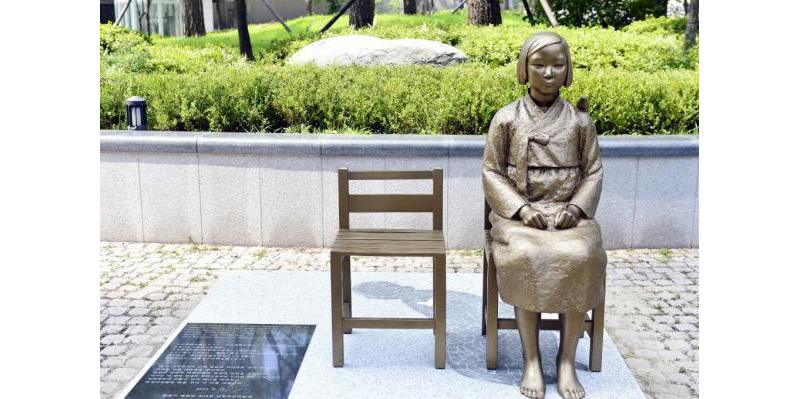Brookhaven To Unveil ‘Comfort Women’ Statue, Despite Japanese Opposition

Courtesy of Helen Kim Ho
On Friday, the city of Brookhaven is set to unveil a memorial statue to honor victims of military sexual enslavement during World War II, known as “comfort women.” Japanese diplomats in Atlanta oppose the memorial, and the statue is stirring up old international tensions.
This is the second try at bringing a memorial to the area. In March, after hearing from the Japanese Consul General, Atlanta’s Center for Civil and Human Rights pulled out of an agreement to display the statue on its grounds.
Brookhaven Councilman John Park said he and other leaders have heard a number of arguments from the Japanese Consulate General about why they shouldn’t allow the memorial.
“It just seems like they were throwing anything at the wall they could and seeing what would stick,” Park said.
He said the city has also received hundreds of private emails “from random Japanese addresses saying really questionable things like, for example that really this is just a North Korean plot to weaken Japan.”
The Consul General has said the memorial would encourage discrimination of Japanese people in Georgia.
“There are identical statues in different places in other parts of the world. And there have been protests and demonstrations along with the statue,” said Tomoko Ohyama, who is with the Consulate General.
Japan issued an official apology to Korea for its comfort women policy in 2015. Many, though not all, of the estimated hundreds of thousands of victims were Korean. Ohyama said statues like the one in Brookhaven hurt relations between the two countries.
Phyllis Kim heads the Korean American Forum of California, which led efforts there to build a similar memorial in Glendale. She said there, too, the Japanese government argued a statue would damage international relations.
“That is their strategy so that people will shut up and not talk about it and erase this history from history books,” said Kim, who plans to attend the unveiling in Atlanta on Friday. She’ll also translate for a survivor who is expected to speak.
In Glendale, the Japanese government filed a brief supporting a lawsuit meant to stop the memorial. That effort ultimately failed.
On Tuesday, the Korean government said it is looking into accusations that Atlanta’s Japanese Consul General, Takashi Shinozuka, made comments denying evidence of the established history of the comfort women policy.
Shinozuka told WABE he denies having told North Atlanta’s Reporter Newspapers the victims were “paid prostitutes.” Reporter Newspapers stands by its story.
“He was trying to say that comfort women were not taken by force. Sometimes it’s described as sexual slavery, but slavery means taken by force,” said Ohyama, seated beside Shinozuka in their Buckhead office. “Whether or not they were taken by force is the seed of dispute.”
The city of Brookhaven said the statue’s unveiling is expected to go forward as planned Friday, which Ohyama said was “regrettable.”
9(MDAxODM0MDY4MDEyMTY4NDA3MzI3YjkzMw004))








